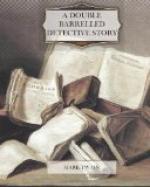Stillman worked his way to the front, and said:
“Yes, I’ll save you. Don’t be afraid.” Then he said to the house, “Never mind how he got the hurt; it hasn’t anything to do with this case, and isn’t of any consequence.”
“God bless you, Archy, for a true friend!”
“Hurrah for Archy! Go in, boy, and play ’em a knock-down flush to their two pair ‘n’ a jack!” shouted the house, pride in their home talent and a patriotic sentiment of loyalty to it rising suddenly in the public heart and changing the whole attitude of the situation.
Young Stillman waited for the noise to cease; then he said:
“I will ask Tom Jeffries to stand by that door yonder, and Constable Harris to stand by the other one here, and not let anybody leave the room.
“Said and done. Go on, old man!”
“The criminal is present, I believe. I will show him to you before long, in case I am right in my guess. Now I will tell you all about the tragedy, from start to finish. The motive wasn’t robbery; it was revenge. The murderer wasn’t light-witted. He didn’t stand six hundred and twenty-two feet away. He didn’t get hit with a piece of wood. He didn’t place the explosive against the cabin. He didn’t bring a shot-bag with him, and he wasn’t left-handed. With the exception of these errors, the distinguished guest’s statement of the case is substantially correct.”
A comfortable laugh rippled over the house; friend nodded to friend, as much as to say, “That’s the word, with the bark on it. Good lad, good boy. He ain’t lowering his flag any!”
The guest’s serenity was not disturbed. Stillman resumed:
“I also have some witnesses; and I will presently tell you where you can find some more.” He held up a piece of coarse wire; the crowd craned their necks to see. “It has a smooth coating of melted tallow on it. And here is a candle which is burned half-way down. The remaining half of it has marks cut upon it an inch apart. Soon I will tell you where I found these things. I will now put aside reasonings, guesses, the impressive hitchings of odds and ends of clues together, and the other showy theatricals of the detective trade, and tell you in a plain, straightforward way just how this dismal thing happened.”
He paused a moment, for effect—to allow silence and suspense to intensify and concentrate the house’s interest; then he went on:
“The assassin studied out his plan with a good deal of pains. It was a good plan, very ingenious, and showed an intelligent mind, not a feeble one. It was a plan which was well calculated to ward off all suspicion from its inventor. In the first place, he marked a candle into spaces an inch apart, and lit it and timed it. He found it took three hours to burn four inches of it. I tried it myself for half an hour, awhile ago, up-stairs here, while the inquiry into Flint Buckner’s character and ways was being conducted in this room, and I arrived in that way at the rate of a candle’s consumption when sheltered from the wind. Having proved his trial candle’s rate, he blew it out—I have already shown it to you —and put his inch-marks on a fresh one.




